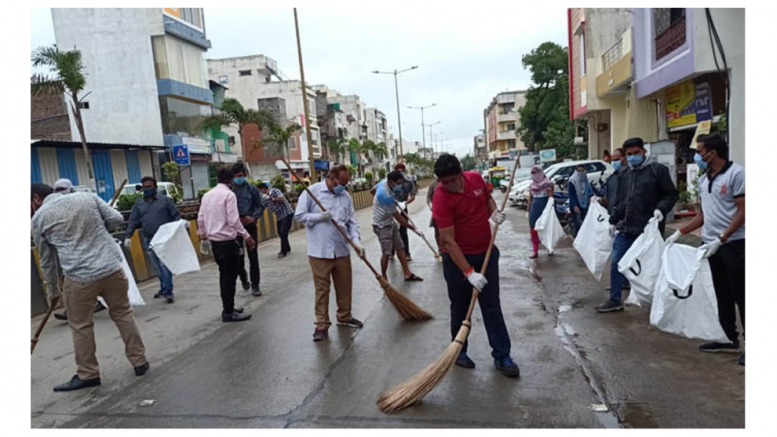Indore, located in the state of Madhya Pradesh, has earned the distinction of being recognised as India’s cleanest city on multiple occasions. The city’s impressive strides in cleanliness and waste management have garnered attention and praise from various quarters, including government bodies and international organisations. Zero Waste is a critical element in sustainability and circular economy and Indore’s efforts to send minimum waste to landfills is noteworthy.
Indore offers valuable lessons on cleanliness, showcasing the effectiveness of a holistic and community-driven approach. The city’s success underscores the importance of a comprehensive waste management strategy, encompassing efficient collection, segregation, and sustainable disposal practices. Strict enforcement of penalties for littering serves as a deterrent and reinforces the need for individual accountability. The city stands as a beacon, illustrating that a combination of civic engagement, stringent regulations, and sustainable policies can lead to transformative outcomes in urban cleanliness and environmental stewardship.
There are several key factors that have led to Indore learning such a worthy recognition but we need to remember that the most important factor of it all is people’s participation in achieving this endeavour. The city’s commitment to a zero-waste model, promotion of the 3Rs (Reduce, Reuse, Recycle), and investment in sanitation infrastructure further contributed to its success. The result is an exemplary model of urban cleanliness and sustainable living that has garnered national recognition and positioned Indore as a leader in India’s Swachh Survekshan rankings.
Swachh Survekshan Rankings:
Indore consistently ranks high in the annual Swachh Survekshan, a cleanliness survey conducted by the Ministry of Housing and Urban Affairs, Government of India. The city’s commitment to cleanliness and waste management is reflected in its top positions in these national cleanliness rankings. Swachh Survekshan’s main objective is to promote widespread public participation and raise awareness among all societal segments of the value of cooperating to improve towns and cities as places to live.
Under the auspices of the Swachh Bharat Mission (Urban), the yearly survey has been able to rally people, resources, and authorities in an attempt to demonstrate that their city is the cleanest in all of India and that sustainable practices are being promoted and encouraged by both residents and ULBs.
Comprehensive Waste Management Plan:
Indore implemented a comprehensive waste management plan that includes efficient waste collection, segregation at source, and sustainable disposal methods. The city focuses on the 3Rs – Reduce, Reuse, and Recycle – to minimise the environmental impact of waste.
Citizen Participation and Awareness:
A crucial aspect of Indore’s success is the active involvement of its citizens in maintaining cleanliness. The city has conducted extensive awareness campaigns to educate residents about the importance of waste segregation, responsible disposal, and the overall impact of cleanliness on public health and the environment.
Penalties for Littering:
To enforce cleanliness standards, Indore has implemented strict penalties for littering and improper waste disposal. This approach acts as a deterrent and encourages individuals to adhere to the city’s cleanliness guidelines.
Public Toilets and Sanitation Facilities:
The city has also invested in improving sanitation infrastructure, including the construction of public toilets and the provision of adequate facilities. Access to clean and well-maintained public toilets contributes to overall hygiene and cleanliness.
Zero-Waste Initiatives:
Indore has been actively working towards achieving a zero-waste model by promoting waste reduction, recycling, and reuse. The city’s commitment to sustainable practices is evident in its efforts to minimize the amount of waste sent to landfills.
Community Engagement:
Community involvement and engagement play a pivotal role in Indore’s cleanliness initiatives. Residents and local communities actively participate in cleanliness drives, tree planting campaigns, and other initiatives that contribute to the city’s overall environmental well-being.
Green Spaces and Urban Planning:
Indore has also focused on incorporating green spaces and sustainable urban planning. The integration of parks, tree-lined avenues, and well-maintained public spaces contributes to the city’s overall aesthetic appeal and environmental sustainability.
Indore’s journey to becoming India’s cleanest city is a testament to the effectiveness of a holistic and integrated approach to waste management, cleanliness, and environmental sustainability. The city’s success serves as an inspiration for other urban centers across India, showcasing the positive outcomes that can be achieved through concerted efforts by the government, residents, and local businesses.
Transforming India into a clean country requires a comprehensive and sustained effort involving government initiatives, community engagement, education, and innovative solutions. Taking lessons from Indore’s journey could very well be the first step.
The views and opinions published here belong to the author and do not necessarily reflect the views and opinions of the publisher.



Be the first to comment on "Lessons in sustainability from the cleanest city for 7 years in a row"